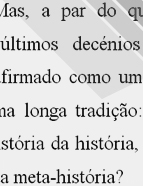

................................
Other sectoral perspectives were enriching this field of study: views on overseas historiography published as part of the Portuguese Discoveries commemorations, medieval historiography, and the presence of the Middle Ages in universities, a gender study on women historians in the latter half of the 20th century—using quantitative methods—on the specific field of rural history, or biographies of historians (on Herculano or Teixeira da Mota). Partial studies were also being produced on historiography dedicated to the First Republic, the Estado Novo, or, more generally, on the historiographies produced in these periods after the April 25th revolution of 1974, in some cases using quantitative methods.
A valuable tool contributed to some of these works: the Repertório bibliográfico da historiografia portuguesa [Bibliographic Repertoire of Portuguese Historiography ] 1974-1994 (1995), which covered a total of 651 authors, allowing for a prosopographical study of this universe. In contrast to the situation during the dictatorship, after the April 25 th revolution of 1974, Portuguese historians predominantly began studying contemporary times—a trend that align ed with their European counterparts. A significant portion of these "institutionalised" historians—linked to higher education—were women (35%). The themes of Historiography, Methodology, and Theory of History experienced a noticeable increase (M.H. Cruz Coelho, "Os historiadores e a historiografia portuguesa no pós-25 de Abril" [" Historians and Portuguese Historiography after the 25th of April Revolution " ], pp.350-361). Another survey published in 1999 confirmed this preference for contemporary topics in catalogued books (1986-96) and doctoral theses (1986-97), also showing the overwhelming dominance of national history themes (85.3%) compared to the limited interest in the history of other countries, including Brazil and African peoples (V. Alexandre, Perfil da investigação ... [Research Profile...] 1999, 9-11). This contrasts with the preference British historians have given to foreign history topics and aligns the Portuguese case with Italian and French historiographies (more focused on their respective national histories) (R.J. Evans, Cosmopolitan Islanders ... 2009, pp.12-13 and C. Charle, Homo Historicus, 2013, pp.31-34). It should be noted, however, that many Portuguese historians have proven to be well-informed about other national histories, often relying on sources and bibliographies in languages other than their own Meanwhile, the preparatory work for a European project by the European Science Foundation enabled the development of statistics on Portuguese historians, also taking into account the institutions to which they were associated (associations, archives, museums), and partially disclosing the general results. ("Portugal", Atlas of European Historiography, pp.122-124).
